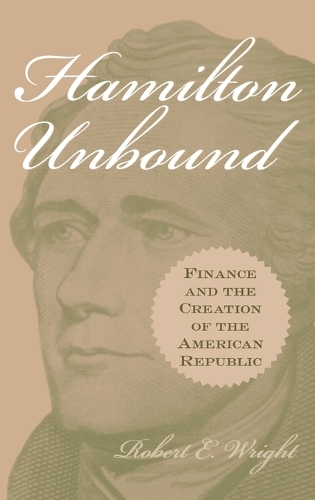
Hamilton Unbound: Finance and the Creation of the American Republic
(Hardback)
Publishing Details
Hamilton Unbound: Finance and the Creation of the American Republic
By (Author) Robert E. Wright
Bloomsbury Publishing PLC
Praeger Publishers Inc
30th August 2002
United States
Classifications
Tertiary Education
Non Fiction
Economic theory and philosophy
Political structure and processes
330.0973
Physical Properties
Hardback
248
Width 156mm, Height 235mm
539g
Description
Applying modern financial theories to early American historiography enables a strikingly novel and compelling recasting of our nation's formative decades. Using modern financial theories enables us to look at old problems in early American Republic historiography from new perspectives. Concepts such as information asymmetry, portfolio choice, and principal-agent dilemmas open up new scholarly vistas. Transcending the ongoing debates over the prevalence of either community or capitalism in early America, Wright offers fresh and compelling arguments that illuminate motivations for individual and collective actions, and brings agency back into the historical equation. As an innovative and insightful synthesis of scholarship, economists, historians, and political scientists alike will be interested in this strikingly novel and compelling recasting of our nation's formative decades. For example, Wright argues that the Colonial rebellion was in part sparked by destabilizing British monetary policy that threatened many with financial insolvency; that in areas without modern financial institutions and practices, dueling was a rational means of protecting one's creditworthiness; that the principle-agent problem led to the institutionalization of the U.S. Constitution's system of checks and balances; and that a lack of information and education induced women to shift from active business owners to passive investors.
Reviews
"Business schools teach financial theories and concepts to enable MBAs to make money. In this fascinating book on early U.S. history, Robert Wright, Ph.D., uses them to explain why Americans declared independence, why they put checks and balances into their constitutions, why Jefferson defeated Adams in the critical election of 1800, why southerners were more fond of dueling than northerners, and why women went from active to passive roles in the early U.S. economy. It is an innovative and path-breaking work of historical interpretation."-Richard Sylla Henry Kaufman Professor of the History of Financial Institutions and Markets and Professor of Economics New York University
[A] good clear amount of some important but relatively untouched subjects.-Journal of the Early Republic
[W]ell worth reading. The author writes in an engaging style and offers more than a couple provocative, well-defended hypotheses. [a]n ambitious attempt to apply the techniques of modern finace to a number of topics not generally thought to be amenable to such an approach.-E.H NET
[W]right provides finance-based interpretations of important events, from the underlying causes of the american Revolution to the adoption of the U.S Constitution, from economic growth to the role of banks and urban finance in the election of 1800, from dueling to the subjugation of women....[r]aises issues that will be of interest to economic historians....Wright is a gifted storyteller and makes exceptional use of documentary archival sources....[w]ell worth reading. The author writes in an engaging style and offers more than a couple provocative, well-defended hypotheses.-E.H Net
This provocative and well-researched work examines early American history from the standpoint of modern financial theory....Highly Recommended. Upper-division undergraduate through faculty collections.-Choice
"A good clear amount of some important but relatively untouched subjects."-Journal of the Early Republic
"Well worth reading. The author writes in an engaging style and offers more than a couple provocative, well-defended hypotheses. an ambitious attempt to apply the techniques of modern finace to a number of topics not generally thought to be amenable to such an approach."-E.H NET
"Wright provides finance-based interpretations of important events, from the underlying causes of the american Revolution to the adoption of the U.S Constitution, from economic growth to the role of banks and urban finance in the election of 1800, from dueling to the subjugation of women....raises issues that will be of interest to economic historians....Wright is a gifted storyteller and makes exceptional use of documentary archival sources....well worth reading. The author writes in an engaging style and offers more than a couple provocative, well-defended hypotheses."-E.H Net
"[A] good clear amount of some important but relatively untouched subjects."-Journal of the Early Republic
"[W]ell worth reading. The author writes in an engaging style and offers more than a couple provocative, well-defended hypotheses. [a]n ambitious attempt to apply the techniques of modern finace to a number of topics not generally thought to be amenable to such an approach."-E.H NET
"This provocative and well-researched work examines early American history from the standpoint of modern financial theory....Highly Recommended. Upper-division undergraduate through faculty collections."-Choice
"[W]right provides finance-based interpretations of important events, from the underlying causes of the american Revolution to the adoption of the U.S Constitution, from economic growth to the role of banks and urban finance in the election of 1800, from dueling to the subjugation of women....[r]aises issues that will be of interest to economic historians....Wright is a gifted storyteller and makes exceptional use of documentary archival sources....[w]ell worth reading. The author writes in an engaging style and offers more than a couple provocative, well-defended hypotheses."-E.H Net
Author Bio
ROBERT E. WRIGHT is Lecturer in Economics at the University of Virginia._He is the author of The Origins of Commercial Banking in America, 1750-1800 (2001), and The Wealth of Nations Rediscovered: Integration and Expansion in American Financial Markets, 1780-1850 (2002).
